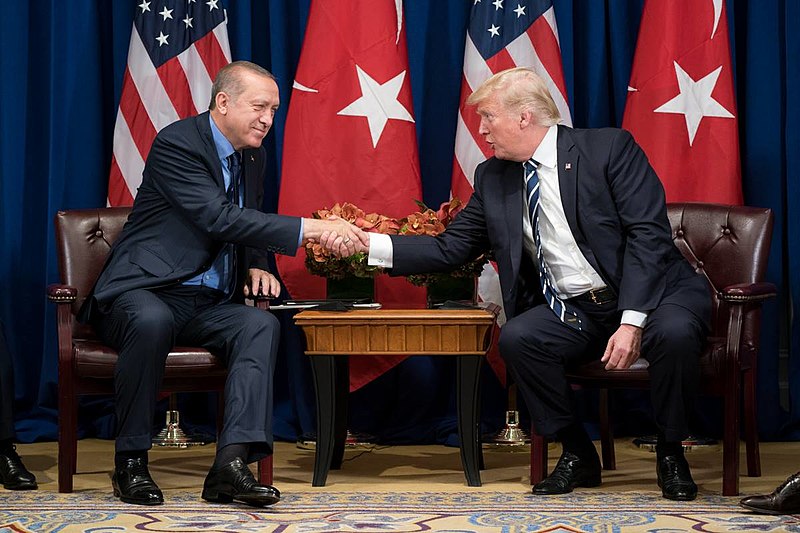Swanson: Trump’s Blunder In Syria Reminds Us To Vote For Strong Foreign Policy In 2020
President Donald J. Trump and President Recep Tayyip Erdoğan of Turkey at the United Nations General Assembly (Courtesy Wikimedia Commons)
November 20, 2019
From the 2018 midterms to the presidential campaigning throughout all of 2019, it feels like American politics has jumped from one election to the next. President Trump has made appearances at rallies throughout the country to make the case that those who sent him to the Oval Office in 2016 should vote for four more years of his administration. On the other side of the political spectrum, more than 15 candidates for the Democratic presidential nomination have held their own rallies and made their case for their candidacy during several televised debates.
Political discourse and the decision to vote for a candidate is always centered around “the issues” and who aligns most with our own stance. The presidential campaign is no different, but despite these candidates pitching their solutions to domestic problems, there has been a failure to put a spotlight on one of the biggest responsibilities a president holds — dictating foreign policy.
The candidates have instead focused on healthcare, taxes and gun control – which is all good and expected, but these policies also intersect with the responsibilities that ultimately fall upon Congress. Until the candidates explain how they plan to pass their policy proposals in Congress, they aren’t accomplishing much more than publicly stating what kind of bills they would veto or sign.
This isn’t entirely the case when it comes to foreign policy. As the commander-in-chief of the military and top executive of the State Department, the president chooses the direction of American foreign policy and makes all critical final decisions. We saw the consequence of this power in action in the recent U.S. withdrawal of troops from Northern Syria that made headlines in early October. The withdrawal ordered by Trump after a phone call with Turkish President Recep Tayyip Erdogan outraged members of both parties, as they recognized that U.S. military presence was the only barrier keeping Turkish forces from moving into the region and initiate military aggression against the Syrian Kurds.

The Kurds reside in Northern Syria and have allied with American forces to fight back against the Islamic State caliphate that had invaded Syria during the civil war. To the surprise of no one familiar with the plight of the Kurds, Turkey soon launched Operation Peace Spring after the troop withdrawal and began to drive out the Kurds from the Syrian-Turkish border.
To those unfamiliar with the Kurds, here is a brief history. The Kurds were left stateless after the dissolution of the Ottoman Empire in World War I, divided amongst the borders of Iraq, Iran, Syria and Turkey. They have been the subject of heavy persecution including throughout modern Turkish history and in Saddam Hussein’s Iraq. The Turkish government has been in an armed conflict with a militant, rebel faction called the Kurdistan Workers’ Party (also known as the PKK) since the mid ’80s. Turkey has labeled them a terrorist group and remains determined to stomp out the resistance, which alone explains Erdogan’s fear of armed Kurds on his southern border who might join the PKK.
The story of the Kurds may not be common knowledge to the American public, but it is something that the president should be aware of. It became clear that Trump misunderstand the conflict when he equated it to two kids in a lot that just need to fight it out, a notion antithetical to the principle of diplomacy. American history is riddled with foreign policy blunders like the wars in Vietnam and in Iraq, and this is just the latest addition to the long list. Because of President Trump’s rash decision to withdraw Americans out of Northern Syria, Kurds have died and more will continue to be killed.
This is what happens when we elect federal officials who don’t fully understand foreign policy. As we contemplate who we want to send to the White House in 2020, we cannot put foreign policy in the back of our mind and hope our candidate will make the right decision. We have to know that they will. It is our responsibility as voters in American democracy to select someone who will prioritize peace and prosperity throughout the world, someone who will not belittle the conflicts that erupt under their watch. It is a choice we have to make carefully, because too often, the rest of the world doesn’t get a say.








